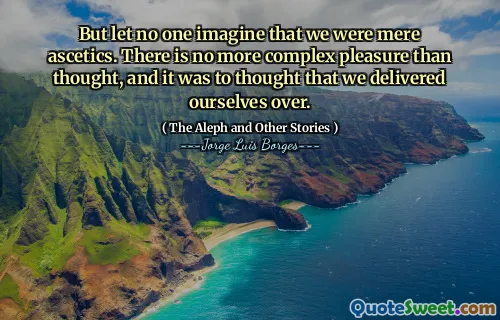
But let no one imagine that we were mere ascetics. There is no more complex pleasure than thought, and it was to thought that we delivered ourselves over.
Jorge Luis Borges's reflections in this quote challenge the simplistic notion that asceticism equates solely to denial of pleasure. Instead, he emphasizes the intricate and profound nature of intellectual pleasure—thinking itself—as a form of sensory and emotional delight. This perspective invites us to reconsider how we perceive pleasure, suggesting that the act of thought is as rich, complex, and fulfilling as any physical experience. The idea that the thinkers or ascetics 'delivered themselves over' to thought highlights a voluntary surrender to a mental quest, a pursuit of knowledge, understanding, and perhaps even beauty within the realm of ideas. It recognizes thought as an activity that, while seemingly abstract, involves intense engagement and sensation, making it a deeply embodied experience in its own right. Borges subtly hints that the most profound pleasures are those of the mind, requiring effort, discipline, and curiosity, and unlike fleeting physical pleasures, they offer lasting fulfillment and insight. This appreciation for mental pleasures elevates the act of intellectual pursuit, positioning it as a vital, enriching dimension of human life. Ultimately, the quote encourages us to value and seek the depths of thought and introspection, understanding that such pursuits are among the most complex and rewarding forms of human experience. It celebrates the noble pursuit of knowledge and understanding as a deeply pleasurable, almost sacred endeavor that confers a sense of purpose and transcendence.






